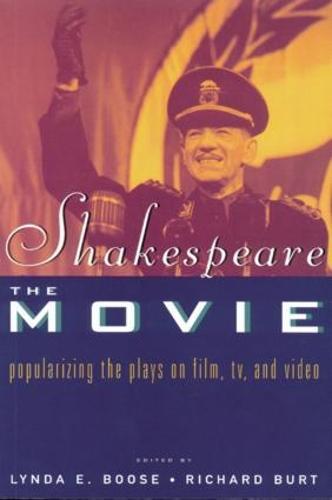Full Product Details
Author: Lynda E. Boose ,
Richard Burt
Publisher: Taylor & Francis Ltd
Imprint: Routledge
Dimensions:
Width: 15.60cm
, Height: 1.40cm
, Length: 23.40cm
Weight: 0.560kg
ISBN: 9780415165853
ISBN 10: 0415165857
Pages: 288
Publication Date: 09 October 1997
Audience:
College/higher education
,
Tertiary & Higher Education
,
Undergraduate
Format: Paperback
Publisher's Status: Active
Availability: In Print

This item will be ordered in for you from one of our suppliers. Upon receipt, we will promptly dispatch it out to you. For in store availability, please contact us.
Reviews
[T]hese essays help us understand how Shakespeare continues to live in the twentieth century, and they do it in a manner incomparably more interesting than the articles in the popular media that appear with nauseating regularity and ubiquity at the release of every new adaptation. Hogdon's piece, like so many of the essays in this collection at their best, combines deftly detailed observation of the filmtexts and an abundance of research into contemporary mass and popular culture (audience responses, interviews, press clippings) with keen readings of the plays and sophisticated reflection on the rhetoric of political discourses. [S]ome of the contributions to the volume simply offer a variety of well-researched cultural histories and thoughtful close readings of the filmtexts from which one can learn a great deal. <br>- Medieval and Renaissance Drama in England <br> Lynda Boose and Richard Burt have collected quality essays that examine filmed Shakespeare from a variety of perspectives. Many of the essays do excellent work in viewing filmed Shakespeare within the context of Hollywood and/or international film, demonstrating how Hollywood colors Shakespeare and how Shakespeare colors Hollywood. <br>- Popular Culture and American Culture Associations, 1998 <br>
[T]hese essays help us understand how Shakespeare continues to live in the twentieth century, and they do it in a manner incomparably more interesting than the articles in the popular media that appear with nauseating regularity and ubiquity at the release of every new adaptation. Hogdon's piece, like so many of the essays in this collection at their best, combines deftly detailed observation of the filmtexts and an abundance of research into contemporary mass and popular culture (audience responses, interviews, press clippings) with keen readings of the plays and sophisticated reflection on the rhetoric of political discourses. [S]ome of the contributions to the volume simply offer a variety of well-researched cultural histories and thoughtful close readings of the filmtexts from which one can learn a great deal. - Medieval and Renaissance Drama in England Lynda Boose and Richard Burt have collected quality essays that examine filmed Shakespeare from a variety of perspectives. Many of the essays do excellent work in viewing filmed Shakespeare within the context of Hollywood and/or international film, demonstrating how Hollywood colors Shakespeare and how Shakespeare colors Hollywood. - Popular Culture and American Culture Associations, 1998
Something is rotten in this collection of essays on film treatments of Shakespeare's plays. Various circumstances - only glanced at here - have created a recent, sizable, and profitable multimedia Shakespearean revival in our midst: from Kenneth Branagh's glamorous epic efforts to cartoons to such maverick adaptations as My Own Private Idaho and Prospero Books. Trying to grapple loosely with this trend, editors Boose and Burr, English professors at Dartmouth and the University of Massachusetts, respectively, present a wide cross-section of Anglo-American essays (including their own unremarkable contributions) drawn from all corners of current critical theory, from deconstructionism to feminist and queer theory. But whatever their ideological and critical underpinnings or their ostensible subjects, most of these essays are about nothing so much as ourselves. Perhaps it is a testament to his genius that every generation can find itself reflected perfectly in Shakespeare. And so, we have Barbara Hodgdon comparing Othello with the O.J. Simpson case in raising issues of race and gender; Katherine Eggert reading Bugsy as a remake of Antony and Cleopatra; Donald Hedrick detecting imperialist impulses in Branagh's Henry V; and so on. Most of the essayists are professors of English, yet their mastery of Shakespeare is usually not matched by their understanding of film and film theory. And despite a few game attempts at delineating the effects of Shakespeare's current filmic popularizations on his plays - most notably, Robert Hapgood's thoughts on Zeffirelli and Tony Howard's on King Lear - most of the contributors here prefer to pace endlessly about in the academic prisons of their thoughts. Some bright, particular stars can be found, but as Hotspur might proclaim: Such a deal of skimble-skamble stuff. (Kirkus Reviews)
Author Information
Richard Burt is Associate Professor of English at the University of Massachusetts. Lynda Boose is Professor of English and Women's Studies at Dartmouth College.




